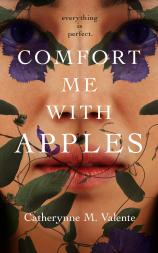Comfort Me with Apples
Review
Comfort Me with Apples
It’s definitely apple season --- I like the kind that aren’t too sweet or soft, with real bite --- and this new fantasy novella has both the brightness and the incipient gloom of autumn.
The title is a biblical phrase from the Song of Solomon (“Comfort me with apples: for I am sick of love”), also used by Ruth Reichl, former editor of Gourmet magazine, for a memoir about her life in food. Reichl, of course, was interested in culinary possibilities. Catherynne M. Valente is way more engaged by the apple’s symbolic potential.
There’s a lot for her to work with: the Golden Apples (granting immortality) and the Apple of Discord in Greek myth, the poisoned apple given to Snow White by the evil queen, not to mention apples and apple pie as emblems of health and wholesomeness and the American way. Most familiar of all is the apple in the Garden of Eden. Devoured by Eve in pursuit of forbidden knowledge, then shared with Adam, it’s the sinful fruit that gets the pair exiled from paradise.
This last one is the legend Valente retells in COMFORT ME WITH APPLES, which I would categorize as more fable or allegory than pure fantasy. The author has been acclaimed for her five middle-grade Fairyland books: The first, THE GIRL WHO CIRCUMNAVIGATED FAIRYLAND IN A SHIP OF HER OWN MAKING, was a crowdfunded online novel before its traditional publication. Given her rich, lyrical prose, I wasn’t surprised to discover that she is a poet as well as a fiction writer.
"Crisp and sharp, this provocative feminist reinterpretation of the Garden of Eden is no candy apple. It has more flavor than that. Go on --- I dare you to take a bite."
Valente seems in love with language itself (her style reminds me a bit of Alice Hoffman’s, which is high praise indeed). But the gorgeous writing is edged with social satire and spliced with horror: bone and flesh and gore. She unpeels the layers gradually, as one would a piece of fruit (each chapter heading is a different kind of apple), hinting at the dark core of her tale until it emerges into full, unsparing light.
COMFORT ME WITH APPLES shows its satirical side particularly at the beginning, when we meet Sophia, a resident of what sounds like an extreme gated community: an authoritarian suburb called Arcadia (cf. Eden) that lies in the midst of a desert. Its citizens are policed by a nightmarish array of rules ranging from acceptable paint colors for houses and the height of grass on lawns to more insidious regulations designed to keep women demure and powerless. Sophia herself is a classic Stepford Wife.
This small, slender woman lives in a giant house with her very large husband, an apparent mismatch, yet she insists that she was “made for him” --- and we don’t realize how literally this is true until the macabre revelations that come later in the book. Sophia is the epitome of the perfect homemaker: cleaning, polishing, shopping, cooking, never complaining.
She and her husband offer an exaggerated parody of gender roles: He rarely sleeps beside her because he is “away a lot” doing “important work.” (Her own work --- “dancing, theater, music, fraternization” --- is denigrated as “nonsense.”) She is warned that “heavy lunches make heavy hips.” Her husband is messy, strewing clothes around the house, and noisy, with a thudding footstep. Her social life is lively, “her company…much in demand.”
Then weird things start to happen. The coarse black hair (not her own) in the brush she finds in a locked drawer (cf. Pandora’s Box). The fingerbone that falls out of the knife rack. The eccentric musician she meets at a neighbor’s party. The growing sense that Sophia herself is almost a community possession on whose happiness or unhappiness the fate of Arcadia rests.
In a fit of rebellion, Sophia tears the house apart and finds evidence of predecessors, ex-wives. She runs off in terror and anger, and finds herself at the Eastern Gate of Arcadia. There she encounters Cascavel, a snaky, sensuous creature who imparts the truth about how she came to exist, the women who came before her (Lilith, for example, the Bible’s quintessential bad girl), and her probable destiny. And she eats a forbidden apple.
When Sophia confronts her husband, he acts exactly like a typical male chauvinist pig, opining that women are “all the same”: inappropriately curious, hungry for attention and babies, and (worst of all) failing to put him first. Adam turns out to be a sort of Bluebeard in his suburban castle --- but I’ll leave it to you, dear reader, to discover the clever, rather grim details.
Will you enjoy COMFORT ME WITH APPLES? A qualified yes, if you aren’t too literal about the Bible’s account of the Creation and have a fondness for allegories. I must confess that I’m not crazy about them, mostly because they tend to reduce characters to symbols. In this case, though, Sophia registered as a genuine person, and I rooted for her to outwit the two males (Adam and God the Father) and survive.
Crisp and sharp, this provocative feminist reinterpretation of the Garden of Eden is no candy apple. It has more flavor than that. Go on --- I dare you to take a bite.
Reviewed by Katherine B. Weissman on November 12, 2021
Comfort Me with Apples
- Publication Date: November 9, 2021
- Genres: Domestic Thriller, Fantasy, Fiction, Suspense, Thriller
- Hardcover: 112 pages
- Publisher: Tordotcom
- ISBN-10: 1250816211
- ISBN-13: 9781250816214




